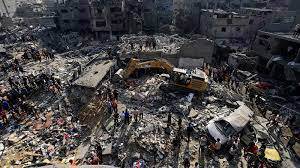GENEVA/MOSCOW/GAZA - The UN’s humanitarian coordinator says there is no longer any humanitarian operation worthy of the name in southern Gaza. Speaking in Geneva, Martin Griffiths said that the pace of the military assault in the south of the Gaza Strip replicated what had been seen in the north, meaning there was no safe space for aid agencies to work. He said that while aid agencies remained in Gaza, and would not abandon its people, they had no sense of clarity, no ability to plan, and no sense of “where this will end.”
Griffiths gave one small note of hope; he said there had been discussions with Israel about opening the Kerem Shalom crossing to allow more humanitarian aid into Gaza.
But aid agencies at the moment are unable to move much beyond Rafah, and Griffiths said that any deliveries within Gaza were purely “opportunistic, erratic, undependable and unsustainable”, relying on finding, at short notice, a road that was not blocked or mined.
The only serious solution, he insisted, was “to silence the guns.” Also, Iranian President Ebrahim Raisi alleges that Western nations are supporting a “genocide” in the Gaza Strip, in reference to Israel’s bombardment of the besieged Palestinian enclave, according to Reuters. Speaking during a visit to Moscow, Raisi said it was necessary for the bombardment to stop “as soon as possible”, and added it was “regretful” that international organisations have not been effective at stopping the violence.
Iran has been one of Hamas’s chief sponsors over the years, providing both financial assistance as well as rockets and other weapons to the Palestinian group.
Heavy urban combat raged in and around Gaza’s biggest cities Thursday as the bloodiest ever war between Israel and Hamas entered its third month since the October 7 attacks. Vast areas of the besieged territory have been reduced to a rubble-strewn wasteland of bombed-out or bullet-scarred buildings as the death toll has soared above 16,200 according to the Hamas-run health ministry.
Israeli forces backed by air power, tanks and armoured bulldozers were fighting Hamas in Khan Yunis, the biggest city in southern Gaza, as well as in Gaza City and the nearby Jabalia district in the north. Prime Minister Benjamin Netanyahu said troops had closed in on the Khan Yunis house of Hamas’s Gaza chief Yahya Sinwar, 61, and vowed that, although he could flee, “it is only a matter of time until we find him”. Air strikes also rained down on Rafah in Gaza’s far south, a city near the Egyptian border that has been turned into a vast camp for many of the 1.9 million internally displaced Palestinians. One of those on the move, Khamis Al-Dalu, told AFP that he had first fled Gaza City and then Khan Yunis for Rafah, where his family was now sheltered in a tent against the worsening winter chill.






